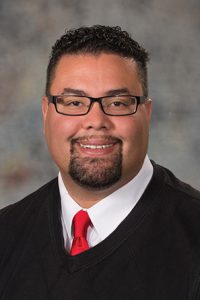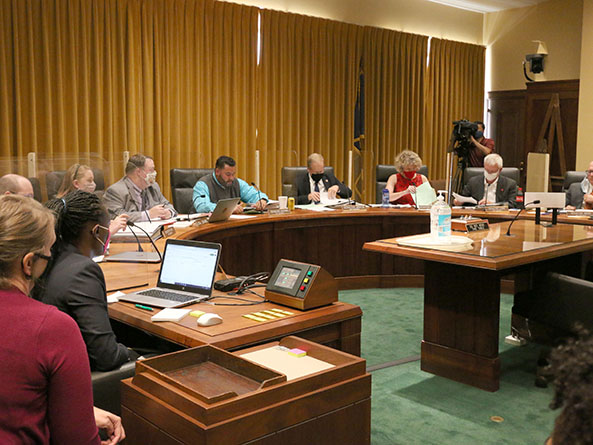Police oversight boards considered
The Urban Affairs Committee heard testimony July 31 on a bill that would require certain Nebraska cities to establish citizen police oversight boards.

LB1222, introduced by Sen. Justin Wayne of Omaha, would adopt the Municipal Police Oversight Act. Under the act, any city that employs full-time police officers would be required to create a seven-member citizen oversight board. Each city’s mayor would appoint board members, with approval of the city council. No law enforcement officer, past or present, would be allowed to serve.
The bill would require each board to:
• investigate all police shootings;
• investigate complaints filed by members of the public against the local police department;
• independently investigate all cases of alleged misconduct by police officers;
• identify all instances of police misconduct and report findings and recommendations to the police department, mayor, city council and all state and federal registries of police misconduct;
• when appropriate, provide law enforcement agencies with evidence in support of any criminal proceedings, disciplinary proceedings or other management actions;
• provide the police department with feedback from members of the public who have direct experience with police practices; and
• monitor, investigate and evaluate policing standards, patterns and practices.
If an investigation reveals apparent criminal wrongdoing by a police officer, the board would present that evidence to the local county attorney.
Wayne said LB1222 would provide meaningful external oversight of police departments across Nebraska, while acknowledging that the proposal is a work in process.
“This may turn into a broader bill, or bills, going into next year, but while this is a hot topic, I thought it was important to have this hearing,” Wayne said.
Several proponents of the bill testified that they were harassed or injured during recent racial justice protests in Lincoln and Omaha.
Michaela Chambers of Omaha said she was arrested July 25 while protesting peacefully and was subsequently detained in a jail cell. She supported the bill, but said it didn’t go far enough.
“I believe this [bill] is the tip of the iceberg,” she said. “You, as our elected officials, can do and should do more for us. To protect us as your citizens. To allow us to have our right to freedom of speech and for that right not to be taken away by the brutality and the aggression shown by sworn officers who made an oath to protect us.”
Kieran Wilson, also testifying in support, said numerous barriers prevent police from being held accountable in Nebraska.
“You have counties in Nebraska in which there isn’t a means to send a complaint to the police department; there isn’t a means to send a compliment to the police department. In the state of Nebraska, police disciplinary actions are not publicly accessible documents,” Wilson said.
Also testifying in support was Maggie Ballard. She said LB1222 would provide oversight of police but that it would not end police misconduct.
“Make no mistake, the unacceptable actions of police officers didn’t stop once the [federal] Civil Rights Act was passed or once stop-and-frisk practices were outlawed,” Ballard said. “In 2014 we thought that putting cameras on police officers or in cruisers would prevent the use of excessive force.”
Omaha Mayor Jean Stothert testified against the bill. She said she recently issued an executive order that expanded police training and strengthened Omaha’s process for citizen complaints. Stothert said the city already has a review board to examine alleged police misconduct and that further oversight would be an overreach.
“LB1222 creates a citizen board that is accountable to no one,” she said. “It threatens the privacy of citizens who have been victims of crime and diminishes the authority of mayors and city councils.”
Also testifying against the bill was Omaha Police Chief Todd Schmaderer. He said the proposal would amount to an unfunded mandate that would cost Omaha $1 million. Civilian oversight is important, he said, but police leaders need to be able to levy discipline and direct the culture of an organization.
“[LB1222] undermines the authority of the chief of police. We’re not even mentioned in the bill,” Schmaderer said. “There needs to be a singular, dedicated leader to set a tone.”
Also testifying in opposition was Lincoln Police Chief Jeff Bliemeister. He said the bill was well-intentioned but could adversely affect ongoing investigations and potential civil lawsuits that could arise from a criminal investigation.
“The public release of information as described in this bill may not only jeopardize an individual’s constitutional right to a fair trial but also disincentivize—which we’re not trying to do—the cooperation of complainants and witnesses and undermine the public trust,” Bliemeister said.
After approximately three hours of testimony, Wayne announced that he had been notified that someone in the hearing room had been exposed to COVID-19. As a result, he said, the hearing on LB1222 would cease “out of an abundance of caution” but written testimony would be accepted via email until Aug. 3.


